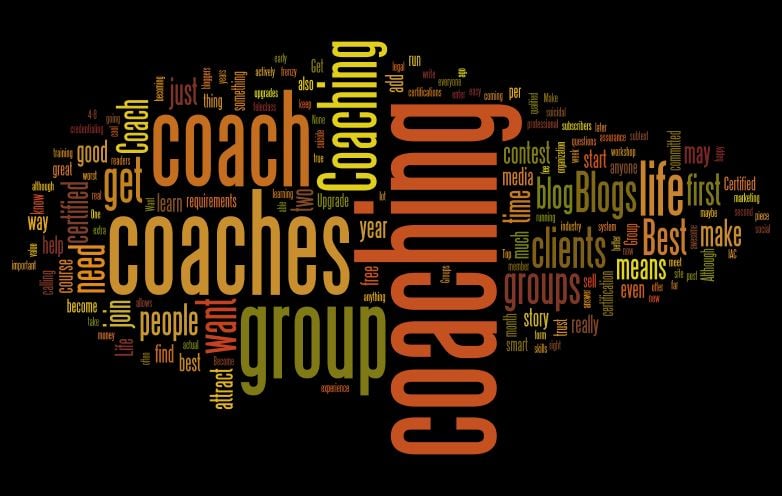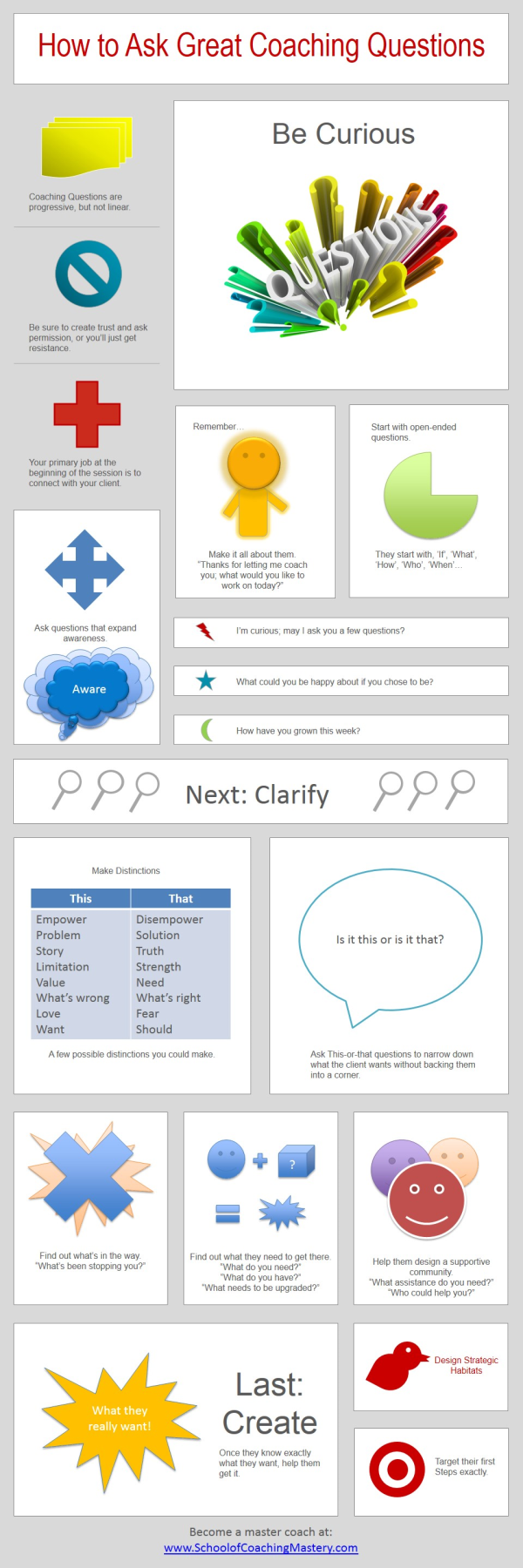



Topics: Become a Master Coach, ICF, Become a Certified Coach, Become a Masterful Coach, master coach, Master Certified Coach, Coaching Tip, Masterful Coaching, Master Coach Training, consulting

''Before buying into any six figure type training, ask to see the teacher's financials...Then run. Far away from cookie cutter trainings and teachers like this...Forget the 6 and 7 figure coach, author & speaker trainings. Those who make money their central theme are playing on your basic survival fears..."
Be sure to read the entire conversation on Maryam's Page (you may need to log in to Facebook, first) before you spend a dime on programs like these, because they are almost always scams...
As I said in my reply to Maryam, I've written on this topic a number of times. I shared several horror stories here. I wrote more recently on the meaninglessness of titles such as 'life coach', here. Do read these posts before working with a 'wealth coach', 'million-dollar coach', 'six-figure coach', 'seven-figure coach', or anybody who calls him/herself a 'coach'. You could save yourself thousands of dollars and years of heartache.
Some of these so-called 'coaches', gurus and teachers have been sued by the likes of the US Securities and Exchange Commission. Others have gone to prison. Their victims have been emotionally devastated, bankrupt, lost their homes, or even lost their lives.
It's a serious problem, but not an easy one to fix. Coaching has a reputation for being high-paid, but to my knowledge, it's still not regulated by any government in the world. Plus most people don't know what it is, except that it involves people talking to each other. That makes it the perfect get-rich-quick scheme for any sociopath who can talk. There are an awful lot of them out there.
Genuine coaches provide valuable services and are nearly always certified by reputable coaching schools and professional associations. They have testimonials from real people you can talk to. Their clients rave about them and you can find them online and research their reputations. Coaches who are certified by the IAPPC, ICF or IAC are usually a good bet.
So why's there a kitten in the picture, above? He's Josey, an abandoned formerly feral baby cat we found half-starved, terrified and awfully lonely. He was desperate enough to let some gigantic strange creatures take him in and feed him and now he's a delightful member of the household. Josey was lucky. Imagine what could have happened to him if a sociopath found him, instead of a family of animal lovers.
When you have a dream of building a 'conscious business', or of answering your calling, or even of becoming wealthy by sharing your brilliance with those who want or need it, you're as vulnerable, and often, as innocent as a kitten. You probably need help from someone who can help facilitate your dream, such as a good coach, but you and your dream can be destroyed by a greedy sociopath. Be careful who you share your dreams with!
Today, Gina Spadafori shared on Facebook that P&G has voluntarily recalled the type of kitten food I feed to Josey. It may be contaminated with salmonella. He was lucky again, because his chow was made in a different batch.
It got me thinking how great it would be if we could recall toxic 'coaches'. It would save a lot of innocent people from being preyed upon. And it would definitely improve the reputation of the coaching profession.
But fake coaches manufacture themselves. They remind me of Sturgeon's Law: 90% of anything is crap. That doesn't mean the top 10% isn't fantastic. In my opinion, million-dollar coaches occupy the bottom 10% of the crap pile.
There is no way to wipe them all out, but you can protect yourself. Stay out of free, or suspiciously low-fee, seminars and webinars. They are designed to get you to spend irrationally. Don't be swayed by money-back guarantees. They usually mean nothing.
Instead, work with certified coaches and get recommendations.
Maryam asked me online what we should do about this problem. I'd like to see a coordinated marketing campaign by coaches, coach-training schools and professional coaching associations that warns the public about unscrupulous coaching practices and how to hire a good coach. I'm not the person to organize this. Do you know someone who is?
If you care about people in general and the coaching profession specifically, please share this blog post or voice your own opinions online. You could save someone from making a horrible mistake.

Topics: life coach, ICF, Business Coaches, certified coaches, coach training schools, Million Dollar Coach, teleclass, IAC, six-figure coaches, six-figure coaching business, IAPPC
Positive psychology coaching is on the rise, because it works. So have you ever wondered how positive psychology coaching can help your coaching business flourish? I'm talking about how actual positive psychology interventions can impact your thoughts and actions to bring you more success, happiness, and yes - more clients.
Curious?
Success occurs when you do the right things at the right times. Positive psychology interventions can help you do the right things at the right times with surprising effectiveness. And it's not precriptive (as in, 'You must do it my way to succeed.'), but rather points out what's worked for others, so you can customize it for your desires, strengths and values.
As a mentor coach who specializes in positive psychology coaching, I see this phenomenon, daily. Here are three recent examples:
When I work with my one-to-one Elite Mentor Coach for High Achievers clients, their frame of mind is often the topic. At one end of the spectrum, the wrong frame of mind, for instance a limiting belief that it's too soon to expect success, can hold the coach back. At the other end, the coach may appreciate her incredible success, but still be stuck experiencing painful thoughts and feelings from the past. In my opinion, neither is experiencing a positive business, yet.
My definition of a positive coaching business is one that is both successful, as defined by the coach, and thoroughly enjoyed. My one-to-one mentor coaching may be financially out of reach for some coaches (although it's not expensive when you consider the training and certification that is included). However, this Fall, I'm putting together a new mentor group that uses the same positive coaching interventions to help coaches build flourishing businesses. It's quite reasonable and includes some training and certification, as well.
If you're a coach who is serious about building a flourishing life and business, click the link below to find out more and/or make an appointment to ask your questions.

Topics: coaching business, group coaching, Coach 100, coaching success, Mentor Coaching, Positive Psychology, positive psychology coaching
 Everybody knows that CEOs and Executives are the folks who all have high-priced executive life coaches. But a new study from Stanford University says there's a big gap between the number of executives who want coaching and the number who actually get it.
Everybody knows that CEOs and Executives are the folks who all have high-priced executive life coaches. But a new study from Stanford University says there's a big gap between the number of executives who want coaching and the number who actually get it.
How many executives want coaching? According to Stanford, virtually 100% want coaching and consulting. How many actually get it? Only 34%. That's a lot of need for executive coaching services that's not being met.
By the way, what's the difference between life coaching and executive coaching? Not much, according to Sherpa. Executive coaches use many of the same communication and awareness-building skills that life coaches use. The difference is largely in who gets coached and how much is charged for it, with executive coaches averaging roughly double what life coaches charge.
To become an executive coach it's important to have a recognized coach certification. Currently ICF certification is preferred by large organizations but many accept other certifications, as well. You also need experience, a great track record and training in areas like positive psychology. Understanding corporate politics may matter, but some coaches say it's more advantageous to come from a background that's completely different from that of big business. To understand why, read the four main reasons CEOs and executives want coaching...
Why do 100% of CEOs and Executives want coaching?
Topics: executive coach, executive coaching, ICF, life coach salary, Coach Certification, Become a Certified Coach, Life Coaching, Positive Psychology


Topics: business coach, life coach, executive coach, coach training, coaching clients, Coach Certification, Great Self Coaching, certified coach, FIND A COACH
 Best Coaching Blogs 2013 is under way and already the social butterflies are pollinating hundreds of admiring voters. (If you haven't entered yet, you still have time to win, but sign up now.)
Best Coaching Blogs 2013 is under way and already the social butterflies are pollinating hundreds of admiring voters. (If you haven't entered yet, you still have time to win, but sign up now.)
I'm going to share some secrets of Online Social Butterflies and how they win Best Coaching Blogs, each year. You see, mastering social media cross pollinates with mastering coaching. That's my evil, um... divine plan!
First, what's a social contest, anyway? It's a win-win online contest that leverages everyone's social reach (friends, contacts and followers on sites like Facebook, Twitter, LinkedIn, and Google+) to attract large audiences for popular voting. Ultimately, everybody wins because contest visitors discover more great coaching bloggers when they visit the site.
Wait! Does that mean coaching bloggers could lose potential clients to their competition? Nope! I'll explain, uno momento.
If you want to see Online Social Butterflies in action, follow the Best Coaching Blogs 2013 List on Twitter. You can pick out the front-runners without even visiting the contest, because they regularly tweet about the contest. Also, search for hashtag, #BestBlogs for related tweets.
Best Coaching Blogs invites coaches who blog on coaching topics to enter their blogs and each year, both new and established blogs win top honors. The winners actively 'play the game' by inviting their readers, colleagues, clients and social reach to come vote for them. People can vote as often as they like, so the contest measures more than just the number of people who like a blog, it also measures passion: both the voters' and the bloggers'.
Passion is a big deal in coaching. It's what ignites clients and creates success. But competition? Not so much. At least not for a lot of clients.
Cooperation, mutual support, acknowledgment, belief in others; that's the stuff of coaching. And it's also the stuff of social media mastery. Both realms, coaching and social media, require that we get our little egos (that part in each of us, that always wants to WIN!!) out of the way and make it all about other folks - without turning ourselves into robots or doormats.
Winning Best Coaching Blogs usually requires more than just a great blog, although great writing and content definitely help. Winning requires the right balance of competition and cooperation. I don't know an English word for that, so I made one up: coopetition.
Here are Some Winning Secrets to Coopetition:
Topics: Coaching, Best Coaching Blogs, blogs, contest, Free, coaching success, Facebook, How to, twitter, Top Life Coach Blogs, master coach, Google, Masterful Coaching, LinkedIn

As our name suggests, at School of Coaching Mastery, we specialize in Master Coach Training. So we've developed quite a bit of expertise around master coaching. It's a whole different approach. One that's recognized and valued by both the IAPPC, ICF and the IAC.
Here are the Top Ten Benefits of Becoming a Master Coach:
I've dedicated my life to master coaching, yours and mine. Are you up for it? Because if you are, the next Master Coach Training, 32-hour program, including 20 hours of advanced practice, starts soon and special pricing is available for a limited time.
This is what I live for. Hope to see you there!

Topics: coaching clients, Become a Master Coach, ICF, Become a Masterful Coach, master coach, Master Certified Coach, Masterful Coaching, masterful coaches, mastery, Master Coach Training, IAC, Masteries, IAPPC
 If you want to become a group coach and enjoy smooth sailing, you need to make three major upgrades, first. Make these three important upgrades and you and your clients will experience the power of groups and coaching success - and you'll be a happy coach.
If you want to become a group coach and enjoy smooth sailing, you need to make three major upgrades, first. Make these three important upgrades and you and your clients will experience the power of groups and coaching success - and you'll be a happy coach.
Why would you want to become a group coach, anyway? Most coaches offer a variety of services within their businesses and group coaching is often the first additional service, beyond one-to-one coaching, that they add, because it allows them to leverage their time, offer a lower-priced option, while making more money. And clients may get even more value from a coaching group, than from personal coaching, so it's a win-win all around.
Here are the 3 Major Upgrades You Need to Make to Become a Successful Group Coach:
Upgrade #1: Your coaching skills. Ten years ago, when I first became a group coach, I thought group coaching would be easy for me to add to my business, because I had been facilitating groups for decades as a college professor. And although my first foray into group coaching was so successful that I had to immediately add a second group to make room for all my clients, I found that coaching a group is much more challenging than I had expected.
Many group coaches make the mistake of leading a workshop or teleclass, instead of coaching a group and they miss the opportunity to customize the experience for each group member. I knew the distinction, but had to learn the hard way how to run a genuine coaching group. It's not as easy as it looks.
Let's face it, most workshops and teleclasses sell for far less money than group coaching; some are even free. If you're going to charge the average group coaching fee of $200 per month, per person, for 4-8 people to coach with you 3-4 hours per month, you need to provide far more value and personalization for each member than you would in a workshop or teleclass. Learn these advanced skills and hit the ground running with your very first group.
Upgrade #2: Your marketing. Lead great coaching groups and you'll have 4-8 times as many happy clients raving about you and your coaching. That's the good news. Filling groups has its own set of challenges. You'll need to reach more people who want to work with you in a group and they need to be able to meet at the same time each week. One common frustration to filling coaching groups is that you'll sometimes attract people who really want to join your group, but can't meet at the same time. This means you need to get really smart about attracting the right people, so you always have a group of eager potential clients with whom to fill your coaching groups - and you need to get smart about scheduling them.
Will you attract group coaching clients with an amazing blog that's optimized for search engines? Or maybe you should attract them by becoming a networking whiz. Or maybe your speaking skills will attract coaching groups to you. Be extra smart: develop multiple ways for clients to find you.
Upgrade #3: Business Administration. Once you start coaching groups, you need to expand your administrative tools and practices. Even getting paid gets dizzyingly complicated if you don't have a great system in place. Get an online payment gateway to manage your clients' payments. Get an email system to keep them up-to-date (and also use it for marketing). Get a virtual assistant if you're not tech savvy (or don't want to be). You'll also need an upgraded approach to scheduling. It's much harder to get 8 people together at the same time than just two.
If you'd like to learn more about coaching groups, sign up for the upcoming Q&A: How to Coach Groups class coming up in two weeks. If you're really serious, take our Group Coaching Mastery course or join the Become a Certified Group Coach program. (Your 'How to Coach Groups' fee can be applied to the course and program if you decide to join them later.)

Topics: group coaching, mentor coach, becoming a certified coach, How to Become a Certified Coach, How to, teleclass
One of our most popular blog posts is 101 Incredible Coaching Questions.
Another is 101 Terrific Positive Psychology Coaching Questions. The thing is, the best coaching questions won't be effective unless you know when and how to ask them. Of course, we teach all the fine points of that at School of Coaching Mastery. And although a few tips won't make you a good coach, this infographic (my 1st-ever original infographic) will help you take that list of 101 coaching questions and start to turn them into some actual coaching. Be sure to check out the options below for next steps toward becoming a professional coach. Some of them are free.

Want to practice coaching? Join our Facebook Page to find coaching buddies. Or join a free study group.
Want to learn much more about coaching and become a great coach?
We offer coach training that is evidence based because people evolve and so does coaching. Here are our two main programs:
Certified Positive Psychology Coach Program offers up to 210 hours of training that will take you from beginner to master coach. Let the power of positive psychology help you coach your clients to success! Take the entire program or take just one course. Get certified by the International Association of Positive Psychology Coaches.
Certified Neuroscience Coach Program offers up to 125 coach training hours informed by research into neuroscience. Take all of this fascinating program or just one course!
Not ready for coach training but want to learn a bit more now?
Download the FREE Become a Positive Psychology Coach eBook. Learn about evidence-based coaching and how to get started in this exciting profession! Click the button below:
Topics: School of Coaching Mastery, coaching questions, How to, positive psychology coaching, IAPPC

It's almost impossible to the miss the story about the two 'life coaches' in Brooklyn who committed suicide this week. That story is everywhere, because it's so ironic. The two actually co-hosted a radio show called, The Pursuit of Happiness!
Apparently, they failed to find it.
This post isn't about them. They clearly were in a lot of pain and their passing is tragic.
This post is rather about the subtext of the media frenzy (okay, it's a small frenzy; let's just call it media attention) surrounding this story.
The subtext asks...
In answer to number 4: No. There are no legal requirements to calling yourself a life coach. Yet.
That means my dog could be a life coach. She may be more qualified than some human life coaches.
And I'm not just singling out life coaches. Business coaches, executive coaches, career coaches, health coaches. None of these titles means anything. In today's world, everyone, including bill collectors, can and do call themselves coaches.
The guy selling vitamins at the health-food store is a nutrition coach. The woman who works at the dress shop is a retail coach. The manager at a telemarketing company is a sales coach.
None of these phrases means anything, because they have come to mean whatever anyone wants.
Right now, there is maximum freedom in the coaching industry, because there are no real legal requirements. That allows massive creativity and growth and that's great for coaches and can be great for clients, too. Although the situation appears to be changing and the suicide story may speed up that change.
The real problem these days is for the consumer who doesn't know whom to trust.
The answer, of course, is credentialing and industry oversight, but a lot of 'coaches' are fighting it.
Really?
That first argument is just paranoid. The second is true. Although, I've seen hundreds of coaches learn to coach much better, while on the way to qualifying for a piece of paper. And the last may, or may not be true, but it's not a good enough reason to not get certified.
Life coaches get certified because they want to be the best they can be. Because they are committed to their profession. Because they feel it is the right thing to do. Because they are proud to be certified. They also get certified to distinguish themselves from the worst of the worst.
Consumers look for assurances that they can trust the life coaches they hire. And they deserve some assurance. That assurance often takes the form of a certification.
I got my first coach certification a decade ago and have qualified for several more, since. I've learned something new with each one. I'm not finished.
Although I believe more in learning than I do in credentials, I've noticed that the goal of credentialing is an effective way to stay focused on learning. It has worked for me and for thousands of other good coaches.
I sell training and certifications to coaches mostly because I want to help good coaches distinguish themselves from ineffective or dishonest coaches. It's an honor to work with people who are committed to being their best. Whether you get certified by my organization or some other, get certified.
Certified Life Coach means something. IAPPC, IAC or ICF Certified Life Coach really means something.
It's time to stop calling yourself just a life coach.
If you want to explore the path to coach certification, click below:
Topics: business coach, life coach, executive coaching, ICF, Life Coaches, Become a Certified Coach, life coach certification, certified life coach, sales and marketing coaches, Life Coaching, life coach training, IAC, IAPPC
If you're a professional Business or Life Coach or you're interested in becoming one, the SCM Coaching Blog covers topics you may want to know about: How to Become a Business or Life Coach, Grow a Successful Coaching Business, Get Coach Training and/or Business and Life Coach Certification, Become a Coaching Master and Evolve Your Life and Business.
Subscribe above and/or explore by tag, month or article popularity, below.© 2014 Julia Stewart Coaching and Training LLC | Privacy Policy